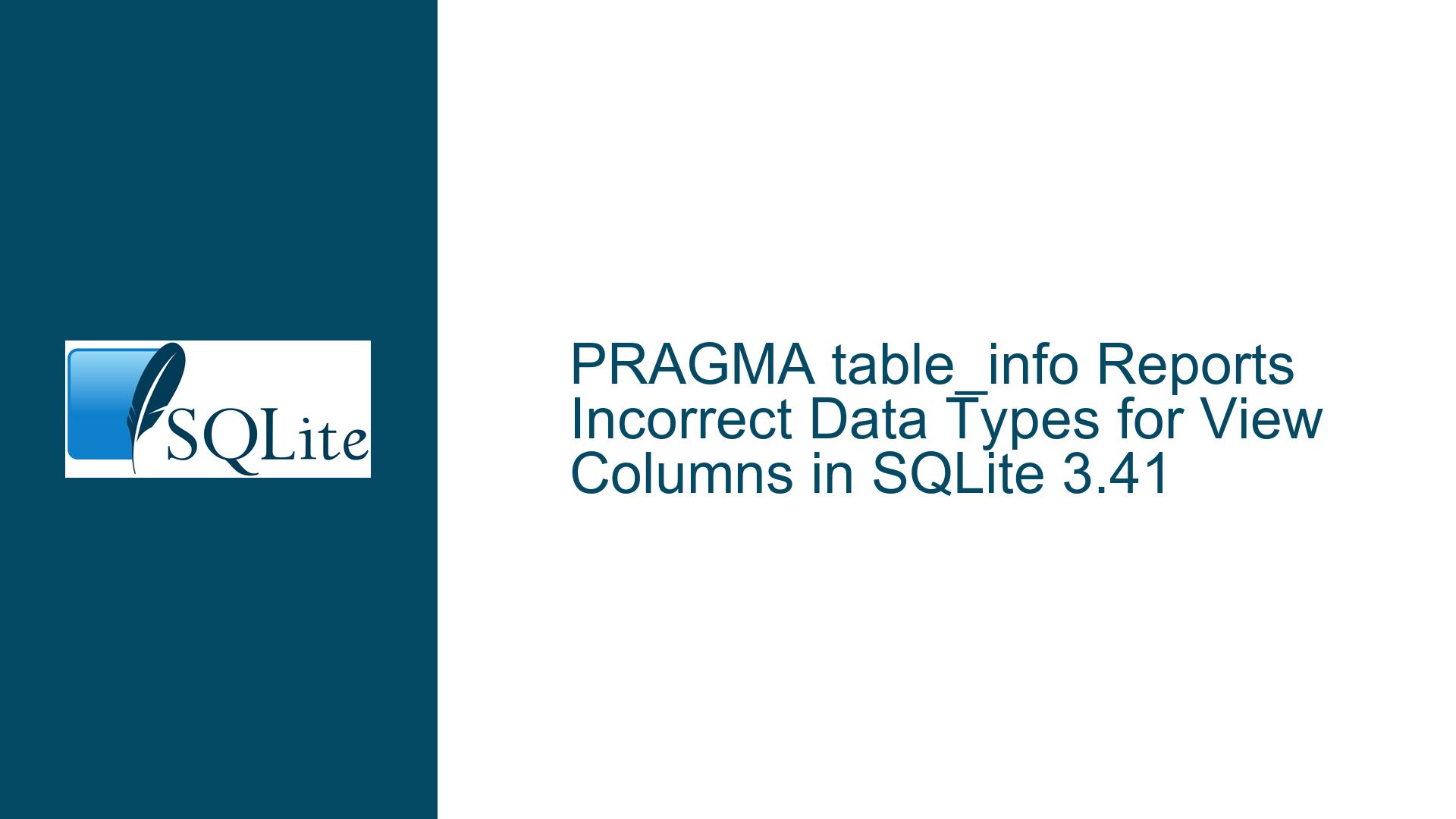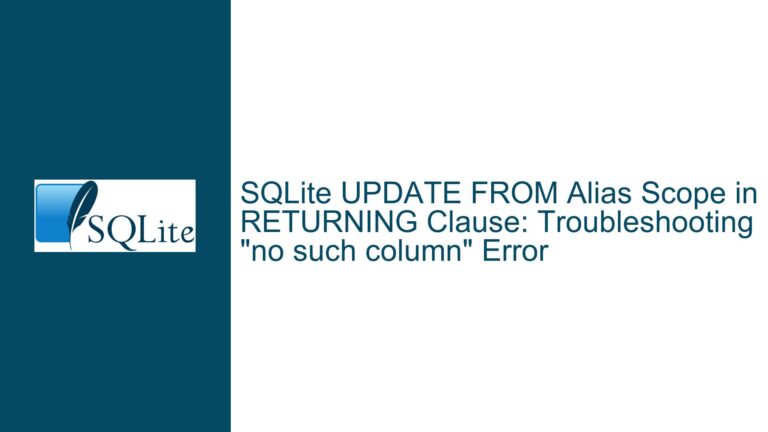PRAGMA table_info Reports Incorrect Data Types for View Columns in SQLite 3.41
Understanding the Discrepancy in Column Type Reporting Between Tables and Views
Issue Overview
A critical regression was identified in SQLite version 3.41 involving the PRAGMA table_info command when used to introspect column data types of views. Specifically, columns in views derived from tables with non-native type declarations (e.g., datetime) were incorrectly reported as NUM instead of retaining the original declared type. This behavior deviated from prior SQLite versions (e.g., 3.39.0, 3.40.x), where the declared type was preserved in views.
Example Scenario:
- A table
foois created with columnsa TEXTandb DATETIME. - A view
foo_viewis defined asSELECT a, b FROM foo ORDER BY a. PRAGMA table_info('foo')correctly reportsbasdatetime.PRAGMA table_info('foo_view')in SQLite 3.41 erroneously reportsbasNUM, whereas earlier versions retaineddatetime.
Impact:
- Introspection tools or ORM libraries relying on
PRAGMA table_infoto infer schema details for views broke unexpectedly. - Applications expecting consistent type metadata between tables and views faced runtime errors or misconfigurations.
Root Observations:
- SQLite does not enforce strict data types; instead, it uses type affinity (TEXT, NUMERIC, INTEGER, REAL, BLOB). Declared types (e.g.,
datetime) are hints for affinity determination. - The regression in 3.41 altered how views propagate declared types via
PRAGMA table_info, prioritizing affinity over the original declaration.
Investigating the Causes of Type Misreporting in Views
Possible Causes
Changes in Type Affinity Resolution Logic
- SQLite 3.41 introduced modifications to how column types are inferred for views. Previously, views propagated the declared type of the underlying table’s columns. The new logic instead derived the type affinity from the column’s expression in the view definition, discarding the original declared type.
- Example:
datetime(affinity: NUMERIC) in the table was reported asNUMin the view due to affinity derivation, whereas earlier versions preserveddatetimeas a "user-defined" type string.
Inconsistent Handling of Explicit Casts
- Explicit casts in view definitions (e.g.,
CAST(b AS datetime)) were ignored in type reporting. Even when developers attempted to enforce the type viaCAST,PRAGMA table_infocontinued to report the affinity (NUM) instead of the cast type. - This suggested a disconnect between SQLite’s internal type resolution for expressions and the metadata exposed by
PRAGMA table_info.
- Explicit casts in view definitions (e.g.,
Divergence Between table_info and sqlite3_column_decltype
- The
sqlite3_column_decltypeAPI (used by tools like APSW) correctly reported the original declared type (datetime) for view columns, whilePRAGMA table_infodid not. This inconsistency indicated that the pragma’s metadata extraction logic was not aligned with other introspection mechanisms.
- The
Version-Specific Regression
- The issue was traced to specific changes in SQLite’s trunk around January 2023 (e.g., check-in [27655c9353620aa5]). These changes inadvertently altered how the
CREATE VIEWcommand stored column type information in the schema, prioritizing affinity over declared types.
- The issue was traced to specific changes in SQLite’s trunk around January 2023 (e.g., check-in [27655c9353620aa5]). These changes inadvertently altered how the
Resolving Column Type Misreporting in Views
Troubleshooting Steps, Solutions & Fixes
Step 1: Verify SQLite Version and Apply Patches
- Confirm the SQLite version using
sqlite3 --versionor runtime APIs. - If using a version between 3.41.0 (initial release) and check-in [497a98363fd1ed07], upgrade to a fixed version (3.41.0+ with the patch).
- Fix Confirmation: After applying the patch,
PRAGMA table_infofor views will report the original declared type (e.g.,datetime) instead of affinity (NUM).
Step 2: Use sqlite3_column_decltype for Accurate Type Metadata
- For programmatic introspection, prefer
sqlite3_column_decltypeoverPRAGMA table_infowhen querying views.sqlite3_stmt *stmt; sqlite3_prepare_v2(db, "SELECT * FROM foo_view", -1, &stmt, NULL); const char *decltype = sqlite3_column_decltype(stmt, 1); // Returns "datetime" - Advantage: This API reflects the declared type from the underlying table or explicit casts, bypassing the pragma’s affinity-based reporting.
Step 3: Modify View Definitions to Enforce Declared Types
- Use explicit
CASTexpressions in views to force type propagation. While this did not resolve the issue pre-patch, post-patch it ensures compatibility:CREATE VIEW foo_view2 AS SELECT a, CAST(b AS datetime) AS b FROM foo; - Post-Patch Behavior:
PRAGMA table_info('foo_view2')will reportbasdatetime.
Step 4: Understand SQLite’s Type Affinity System
- Native Affinities: TEXT, NUMERIC, INTEGER, REAL, BLOB.
- Declared Types: SQLite parses column declarations to determine affinity (e.g.,
DATETIME→ NUMERIC). Tools may still need to map affinity to application-specific types. - Best Practice: Design schemas using native affinity keywords (e.g.,
TEXTinstead ofVARCHAR) to avoid ambiguity.
Step 5: Update Introspection Logic for Views
- Prefer querying
sqlite_schemaor usingSELECT * FROM pragma_table_info('view_name')(requires SQLite 3.16+) for programmatic access. - Example using
sqlite_schema:SELECT sql FROM sqlite_schema WHERE name = 'foo_view'; -- Parsing the view definition may reveal original column types
Step 6: Regression Testing for Future SQLite Upgrades
- Implement unit tests that validate
PRAGMA table_infooutput for critical views after upgrades. - Example test case:
def test_view_column_types(): conn = sqlite3.connect(':memory:') conn.execute('CREATE TABLE foo (a TEXT, b DATETIME)') conn.execute('CREATE VIEW foo_view AS SELECT a, b FROM foo') cursor = conn.execute("PRAGMA table_info('foo_view')") columns = {row[1]: row[2] for row in cursor.fetchall()} assert columns['b'] == 'datetime', f"Unexpected type: {columns['b']}"
Step 7: Community and Version-Specific Workarounds
- For environments where upgrading SQLite is not immediately feasible:
- Use a combination of
PRAGMA table_infoandsqlite3_column_decltypeto cross-validate column types. - Override type mappings in application code (e.g., treat
NUMasdatetimeif the column name isb).
- Use a combination of
Conclusion:
The regression in SQLite 3.41 highlighted the delicate balance between type affinity resolution and metadata reporting. By understanding the interplay of declared types, affinity derivation, and introspection APIs, developers can ensure robust schema management across SQLite versions. Always validate metadata strategies against the latest SQLite releases and prefer APIs that align with your type-reporting requirements.






